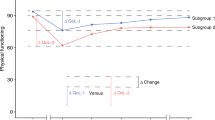Abstract
Background
Patients with esophageal cancer often feel depression or fear of death influenced by multiple clinical factors. This study sought to investigate the clinical factors associated with psychological distress, focusing on the influence of health-related quality of life (HRQOL) for better psychological management of patients with esophageal cancer.
Methods
In total, 102 of 152 consecutive patients surgically treated at Toranomon Hospital met the eligibility criteria for analysis. Questionnaires designed to identify psychological distress and QOL (EORTC QLQ C-30/OES18) were administered at five time points during the treatment course. Degree of psychological distress was assessed by Hospital Anxiety and Depression Scale (HADS).
Results
Patients with HADS score ≥ 11 at each visit showed significantly higher level of symptoms or problems measured by the score of EORTC QLQ C-30/OES18 compared with those with HADS score ≤ 10. Emotional status was a significant factor associated with psychological distress at all times. Although functional scales including global health status or QOL status and symptom scales associated with esophageal cancer were strongly associated with psychological distress before treatment, scales associated with changes in habitus after esophagectomy showed significant correlation with psychological distress after surgery. No significant correlation was observed between psychological distress and individual baseline characteristics, apart from history of surgery and pathological staging.
Conclusions
Psychological distress during treatment course of esophageal cancer is significantly associated with HRQOL influenced by esophagectomy. The current results may warrant prospective intervention through enhanced recovery after surgery to better manage patients undergoing highly invasive procedures for esophageal cancer.




Similar content being viewed by others
Abbreviations
- HRQOL:
-
Health-related quality of life
- HADS:
-
Hospital Anxiety and Depression Scale
- EORTC QLQ-C30:
-
The European Organization for Research and Treatment of Cancer Quality of Life Questionnaire Core 30
- EORTC QLQ OES-18:
-
The European Organization for Research and Treatment of Cancer Quality of Life Questionnaire OES 18
References
Hellstadius Y, Lagergren P, Lagergren J, et al. Aspects of emotional functioning following oesophageal cancer surgery in a population-based cohort study. Psycho Oncol. 2015;24:47–53.
Hamer M, Chida Y, Molloy GJ. Psychological distress and cancer mortality. J Psychosom Res. 2009;66:255–8.
Silver JK, Baima J, Mayer RS. Impairment-driven cancer rehabilitation: an essential component of quality care and survivorship. CA Cancer J Clin. 2013;63(5):295–317.
Subramaniam S, Kong YC, Chinna K, et al. Health-related quality of life and psychological distress among cancer survivors in a middle-income country. Psycho Oncol. 2018;27:2172–9.
Lagergren P, Avery KNL, Hughes R, et al. Health-related quality of life among patients cured by surgery for esophageal cancer. Cancer. 2007;110:686–93.
Hulbert-Williams N, Neal R, Morrison V, et al. Anxiety, depression and quality of life after cancer diagnosis: what psychosocial variables best predict how patients adjust? Psycho Oncol. 2012;21:857–67.
Ochiai Y, Kobori A, Nukariya K. Psychological risk factor of postoperative delirium in patients with gastrointestinal cancer. Jikeikai Med J. 2016;63:37–433.
Hong J, Wei Z, Wang W. Preoperative psychological distress, coping and quality of life in Chinese patients with newly diagnosed gastric cancer. J Clin Nurs. 2015;24:2439–47.
Sobin LH, Gospodarowicz MK, Wittekind C, International Union against Cancer, editors. Oesophagus including oesophagogastric junction. TNM classification of malignant tumours. West Sussex, UK: Wiley-Blackwell; 2009. p. 66–72.
Dindo D, Demartines N, Clavien PA. Classification of surgical complications: a new proposal with evaluation in a cohort of 6336 patients and results of a survey. Ann Surg. 2004;240:205–13.
Zigmond AS, Snaith RP. The hospital anxiety and depression scale. Acta Psychiatr Scand. 1983;67:361–70.
Kugaya A, Akechi T, Okuyama T, et al. Screening for psychological distress in Japanese cancer patients. Jpn J Clin Oncol. 1998;28(5):333–8.
Kitamura T. Hospital Anxiety and Depression Scale. Seisinka Sindangaku 1993;4: 371–372 (Japanese).
Tabano M, Condosta D, Coons M. Symptoms affecting quality of life in women with gynaecologic cancer. Seminarsin Ontol. Nurs. 2002;18(3):223–30.
Fayers PM, Aaronson NK, Bjordal K, et al. The EORTC QLQ C30 scoring manual (3rd Ed.). Brussels: European Organisation for Research and Treatment of Cancer; 2001.
Ayana BA, Negash S, Yusuf L, et al. Reliability and validity of Amharic version of EORTC QLQ-C 30 questionnaire among gynecological cancer patients in ethiopia. PLoS ONE One. 2016;11:e0157359.
Fujita T, Okada N, Sato T, et al. Translation, validation of the EORTC esophageal cancer quality-of-life questionnaire for Japanese with esophageal squamous cell carcinoma: analysis in thoraco-laparoscopic esophagectomy versus open esophagectomy. Jpn J Clin Oncol. 2016;46(7):615–21.
De Boer AG, Genovesi PI. Quality of life in long-term survivors after curative transhiatal oesophagectomy for oesophageal carcinoma. Br J Surg. 2000;87:1716–21.
Kim SH, Oh EG, Lee WH. Symptom experience, psychological distress, and quality of life in Korean patients with liver cirrhosis: a cross-sectional survey. Int J Nurs Stud. 2006;43:1047–56.
Blazeby JM, Brookes ST, Alderson D. The prognostic value of quality of life scores during treatment for oesophageal cancer. Gut. 2001;49:227–30.
Batty GD, Russ TC, Stamatakis E, et al. Psychological distress in relation to site specific cancer mortality: pooling of unpublished data from 16 prospective cohort studies. BMJ. 2017;356:j108.
Funding
None declared.
Author information
Authors and Affiliations
Contributions
YO, KI, and EM designed the study, wrote the manuscript, revised it critically for important intellectual content, and approved its content; YO, KI, JS, MU, HU and EM created the study materials and recruited patients.
Corresponding author
Ethics declarations
Ethical statement
All procedures performed in studies involving human participants were in accordance with the ethical standards of the institutional and national research committee and with the 1964 Helsinki Declaration and its later amendments or comparable ethical standards.
Conflict of interest
The authors declare that they have no competing interests.
Informed consent
Informed consent was obtained from all individual participants included in the study.
Additional information
Publisher's Note
Springer Nature remains neutral with regard to jurisdictional claims in published maps and institutional affiliations.
Electronic supplementary material
Below is the link to the electronic supplementary material.
Rights and permissions
About this article
Cite this article
Ohkura, Y., Ichikura, K., Shindoh, J. et al. Relationship between psychological distress and health-related quality of life at each point of the treatment of esophageal cancer. Esophagus 17, 312–322 (2020). https://doi.org/10.1007/s10388-019-00710-y
Received:
Accepted:
Published:
Issue Date:
DOI: https://doi.org/10.1007/s10388-019-00710-y




